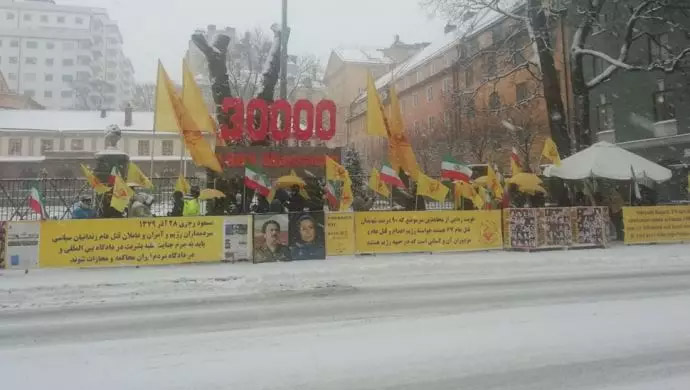Hamid Noury continued to testify and answer questions on Wednesday and Thursday in a court in Stockholm, Sweden, where he is being tried for taking part in crimes against humanity during the 1988 massacre of political prisoners in Iran.
Noury, who was arrested on a trip to Sweden in 2019, was a prison guard in Evin and Gohardasht prisons in Tehran and Karaj in the 1980s. During this time, he participated in the torture and execution of political prisoners, especially the members of the People’s Mojahedin Organization of Iran (PMOI/MEK).
In dozens of court hearings in the past few months, survivors and witnesses of the atrocities in Iran’s prisons have testified on the crimes committed by Noury and other regime authorities in Gohardasht and other prisons. The provided exact dates, names, and details of prisoners who were executed during a mass purge of Iran’s prisons in the summer of 1988.
But when it became Noury’s turn to testify, he resorted to insulting members of the MEK, praising the regime’s murderous leaders, and denying the undeniable crimes that he, his cohorts, and his masters have committed.
Noury continued the same line of behavior during Wednesday and Thursday’s session, and to drive his point, he used profane language against the plaintiffs and their lawyers.
Denying undeniable evidence
In previous sessions, Noury had described the 1988 massacre as a fictional story that has been concocted by the MEK and their supporters. He also denied the existence of a fatwa by then-regime supreme leader Ruhollah Khomeini, which explicitly ordered all prisoners who support the MEK to be executed.
In this session, Noury claimed that an audio file of Ayatollah Hossein-Ali Montazeri that was made public in 2016 was also fabricated. In the audio file, Montazeri, who was in line to be the successor of Khomeini in 1988, had criticized regime officials who had been handing out death sentences to political prisoners and called the 1988 massacre “the biggest crime” of the Islamic Republic. The conversation was with members of the Death Commission, a group of officials who summoned prisoners and decided their fate. Any prisoner who refused to disavow support for the MEK would be immediately sent to the gallows. The so-called trials lasted no more than a few minutes and the prisoners were deprived of access to lawyers and judicial processes. Montazeri later fell out with Khomeini and was stripped of his titles and forced into house arrest until his death in 2009.
In his remarks, Noury described Montazeri as a “liar” and a “simpleton who believed anything.”
Noury was also asked about remarks made by Moussavi Ardebili, a Friday prayer leader who, at the time, had called for the execution of all MEK prisoners. Several ex-prisoners who testified in court explicitly said that they heard Ardebili call for the execution of MEK members. Noury denied the claim and said, “Ardebili has not said such a thing.”
Also in his testimony, Noury denied the existence of Khavaran, a site south of Tehran where thousands of victims of the 1988 massacre were secretly buried. The existence of Khavaran has been well-documented and acknowledged by many human rights experts and organizations across the world. Khavaran is one of several such sites scattered across Iran where the regime has tried to hide the traces of the 1988 massacre. The regime has imposed severe restrictions on Khavaran and prevented families of executed political prisoners to hold ceremonies and gatherings at the site.
When asked about Khavaran, Noury said, “There is no such thing,” and added that Khavaran is a “story made up by the communists.”
Noury also denied the June 20, 1981, demonstration by the supporters of MEK. That date marked the beginning of the open suppression of the MEK by the Khomeini regime. After the 1979 revolution, Khomeini had gradually increased repressive measures against the MEK, using plainclothes gangs to attack meetings and offices of MEK members and supporters. Dozens of MEK members were killed by the regime’s thugs during the first two years following the 1979 revolution. On June 20, 1981, hundreds of thousands of supporters of MEK gathered in Tehran to call for the respect of liberties and human rights. In response, Khomeini ordered the Revolutionary Guards to open fire on protesters. The MEK was then banned, and the regime started an all-out crackdown on the opposition, arresting, torturing, and executing tens of thousands of members and supporters of the MEK.
Despite videos, photos, and testimonies of the demonstration and the regime’s violent response, Noury denied that such a demonstration ever took place.
Noury’s lies under oath in an official court are exemplary of the regime he serves, a tyrannical state that commits crimes lies about them and changes facts on the ground to serve its needs. This is a regime that has lied to its own people and to the world for more than four decades. Especially regarding the MEK, the regime has gone to great lengths to disseminate lies, spread propaganda, and blame them for the crimes it has committed against the opposition and the people of Iran.
Noury’s trial is shedding light on a small fraction of these crimes and lies. As the truth comes to light, the world will come to better know the regime and the opposition that has made so many sacrifices to achieve freedom and democracy in Iran.





